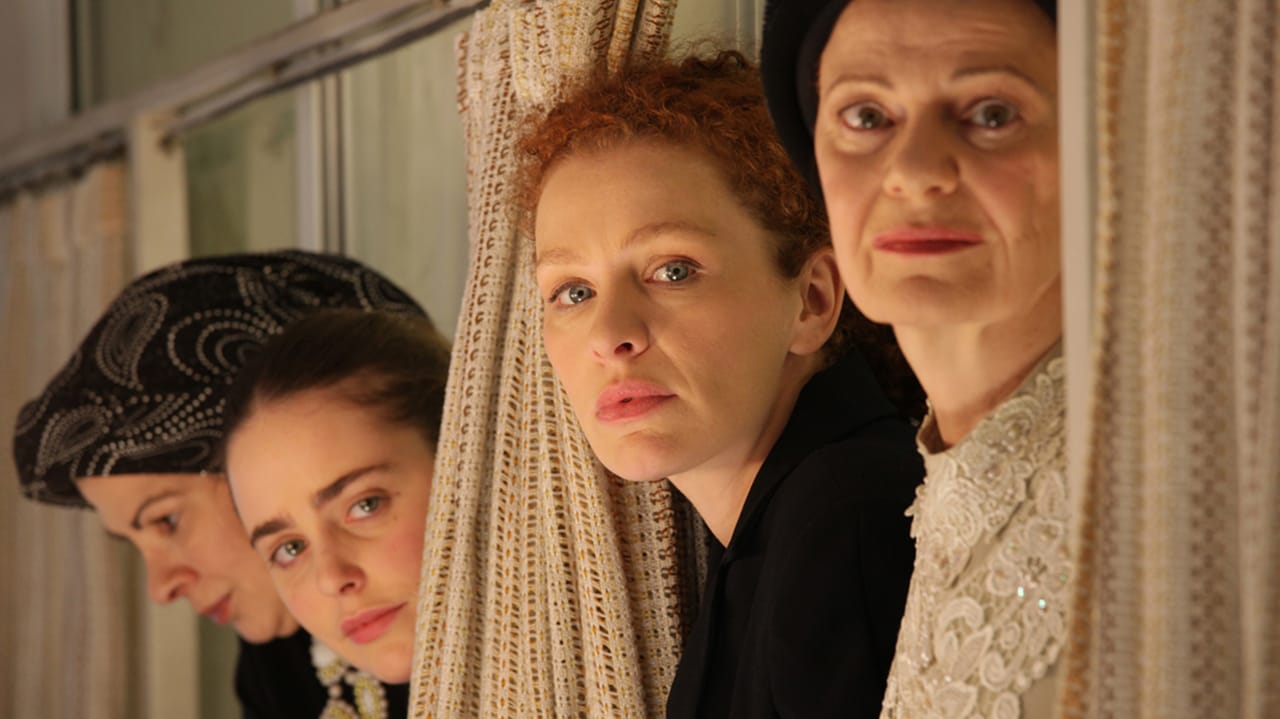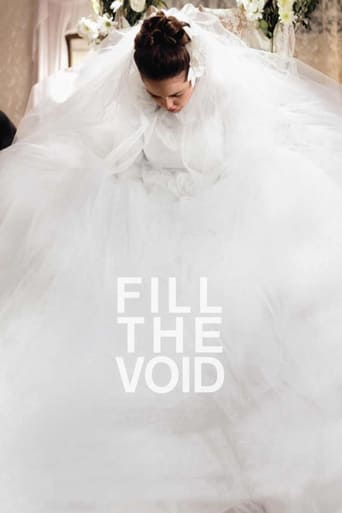



brilliant actors, brilliant editing
Clever and entertaining enough to recommend even to members of the 1%
View MoreThis is a coming of age storyline that you've seen in one form or another for decades. It takes a truly unique voice to make yet another one worth watching.
View MoreOne of the most extraordinary films you will see this year. Take that as you want.
View MoreThe first time I tried to watch this film I closed the TV about halfway through because it was too static. This time I decided to stick with it to the end, even though my mind kept wandering all the time - it is simply too low-key and visually drab to keep the interest. Just one example: in the early scene where the heroine's sister collapses in the bathroom, we don't see her at all - the camera is stuck somewhere across the room and we are briefly shown alarmed characters outside the bathroom, then cut to the next scene. I wanted to scream: not this way! They should have shown what happens in the bathroom, with camera moving and close-ups of the actors.Those actors cannot be blamed, they all make you believe that they are the characters they play. Except maybe the leading actress, who is too beautiful for her role - they should have cast someone less glamorous, because she is too much in contrast with the dreariness of everything around her. The major merit of this film is the portrayal of a culture rarely shown in film, but as film-making it badly lacks energy.
View MoreRama Burshtein's first feature film Lemale et ha'halal / Filling the Void was awarded the prize for the best Israeli movie in 2012 and yet, it belongs to a genre which is quite unique in the landscape of the Israeli cinema. Films about the life of the ultra-Orthodox community are made in the low numbers and I can remember only one such significant film of this kind, (the slightly better) Ha-Ushpizin. Paradoxically, Filling the Void was to some extent a reaction of the director to Gidi Dar and Shuli Rand's film, which she did not appreciate as authentic enough and respectful enough towards the ultra-Orthodox ('haredi') community (I did not have any such feeling when I saw their film). It took many years to the director (an ultra-Orthodox herself, quite a unique status in her community) and the effort deserves a lot of respect, and so does the resulting film as well.Let us try to make abstraction of the location (the small haredi community in the most secular city of Tel Aviv) and look at this film as to any other 'ethnic' movie. The story talks about the dilemma of a beautiful young girl who reached the age of marriage. In her community marriage is always arranged and blessed by the parents. There is a slight room for decision for the young woman who can meet the candidates and refuse the match if she does not like them. Not much more than this however. And there are more rules. As her elder sister dies at birth-giving, her mother takes the new born in her care, but the best interest of the family and the community is that the girl would marry the widower. The balance between duty and love can tear the soul of any young woman, but especially the one of a girl living in a community in which women's principal destiny is marriage, and where the choice happens only once in one's life. Eventually things arrange, as the widower is also the most handsome and most sensitive male around and because all decisions (important or small details of life) reach eventually the wise rabbi who plays the role of the 'deus ex machina' in the Hollywood scripts. (how appropriate this Latin expression is here).The script is far from perfect from an intrigue point of view, and there are more flaws to come. Unless the script written by Rama Burshtein for director Rama Burshtein was fully respectful to the the norms of the community she lives in she would never make the film. So there is no explicit critic or social comment whatsoever in this film, and this may make the blood boil to many feminist and not-so-feminist but secular viewers. The handling of money as a way to solve problems during the audiences at the rabbi may be considered kind of a satire, until you know that this is actually the way a Purim custom is enacted at the rabbinical courts. The lack of social comment is replaced by a painful attention to the details of the rituals and life of the community and the individuals living within. Rama Burshtein succeeds to create many charming moments of true cinema, either by unusual camera angles (the scene of the circumcision), by elaborate costumes and authentic setting, or by directing a team of actors, many of them non-religious (like Hadas Yaron and Yftach Klein in the lead roles) into the details not only of the tradition that the characters represent and of the emotions that they feel.There is a lot of curiosity and openness from the non-religious or not-so-religious sectors of the Israeli society towards the lives and feelings of the ultra-Orthodox community and this is reflected also by the success of this film. Rama Burshtein is a talented film maker but taking into consideration her community and style of life I wonder if there will be a second film at this level of achievement - because despite its flaws 'Fill the Void' is an achievement in its own way.
View MoreOne reason to view FILL THE VOID, written and directed by Rama Burshtein, is the opportunity to view the clothing, the mannerisms, the singing (endless), and the other unique characteristics of Israel's ultra-Orthodox Hasidic community. For those who have never witness this spectrum of Judaism it is an eye-opening experience: religious law, tradition and the rabbi's word are absolute. Marriages are arranged and a woman's outside options are limited, as marriage is a central and crucial moment in their lives. Matches are arranged, decisions about whom to marry are critically important, but apparently the woman always has the right to turn down a prospective suitor. Of importance to note, Rama Burshtein comes form this community and her understanding of all the permutations is obvious.Shira (Hadas Yaron), a devout 18-year-old Israeli, has come of age and is considering marriage, having met her first serious suitor Yossi (Ido Samuel). Shira's eldest sister Esther (Renana Raz) suddenly dies in childbirth leaving her grieving husband Yochay (the very handsome and talented Yiftach Klein) with a son and no mother to care for the infant. Despite his grief (and the grief of Shira's parents - Irit Sheleg and Chayim Sharir) Yochay decides he must marry. Shira's other sister Frieda (Hila Feldman) declares that Esther had informed her that should anything happen to Esther, Frieda should marry Yochay. Shira's mother, afraid that Yochay will take the offer from a Belgium woman to marry and thus move away with her grandson from Tel Aviv, encourages Shira to marry Yochay. Shira is conflicted, gains support from her armless unmarried aunt Hanna (Razia Israeli) who knows that in this community a woman MUST be married, and after much discussion among the Rabbi (Melech Thal) and the family and Yochay and Shira, a conversation between the couple seals their fate.The acting is excellent, the cinematography often times seems flooded with light and slightly out of focus as if taken through layers of wedding veils (!), the costumes are amazing even they are the usual dress mode of this Hassidic community, and the attention to detail of such moments as Purim and Shabbat are immaculate. The seemingly endless amount of singing by the men does grow a bit wearisome and covers dialogue at times, but this is a fresh and fascinating view of love, traditions, and laws and the still viable personal choices in this colorful community. In Hebrew with English subtitles. Grady Harp
View MoreThis was an interesting movie, as others have pointed out, because it gives a behind-the- scenes look at Orthodox Jews. But a big disappointment (for me, philosophically) was when Shira commented, "Maybe this is the way it was meant to work out." I can't remember the exact words, but that was the idea—that this marriage with her brother-in-law was somehow fated and her destiny. This school of thought legitimizes ANY action by dragging in fate. WHATEVER I do, it was "fated." Blah. Nonsense! Also, a little shiver went through me as I watched this because I was reminded of my junior prom in high school. I took the younger sister of my best friend. I was creeped out the whole time because (of course!) the younger sister had many of the characteristics of my friend...it was almost like dating him! Needless to say, I had no more dates with the younger sister. How much creepier it would be to marry your sister's husband! Kinky maybe, but definitely creepy. Inevitably he would call you by her name, attribute her qualities to you, etc. It's almost like you would be sacrificing your own identity to resurrect your dead sister. Yuk. And I think that's why the director ended the movie by showing them together in the bedroom after the wedding: What now? Was this really such a great idea? Another observation, which applies to Amish, Mennonites, etc. as well as to Orthodox Jews--why pick a period in time (the 17th c. seems to be a favorite) and pretend you still lived in 1650? If you were TRULY Orthodox, wouldn't you dress the way Moses did (for example)? Why seize upon Eastern Europe c. 1650? Those silly fur hats might be just the thing for a brisk Minsk winter, but they're just silly in balmy Israel. And surely Israel would be far more "authentic" and "Orthodox" than Minsk. Finally, I was reminded of my year living in a neighborhood filled with Lubovitch Jews. Occasionally the lady across the street would come over and ask me to turn on her stove on the Sabbath. No problem, I was happy to "help." Then one day I decided to check out the Sabbath regulations in the Old Testament. Sure enough, you weren't supposed to "work" on the Sabbath, which, if you stretched it, could include turning on the stove (how about the lights? And of course how about the effort required to walk across the street to get me to turn on the stove vs. the effort to simply turn on the stove myself?). But...wait! read a little further: these regulations also applied to "the stranger living among you." Surely I was the epitome of "the stranger living among you"! I still can't figure that one out.
View More